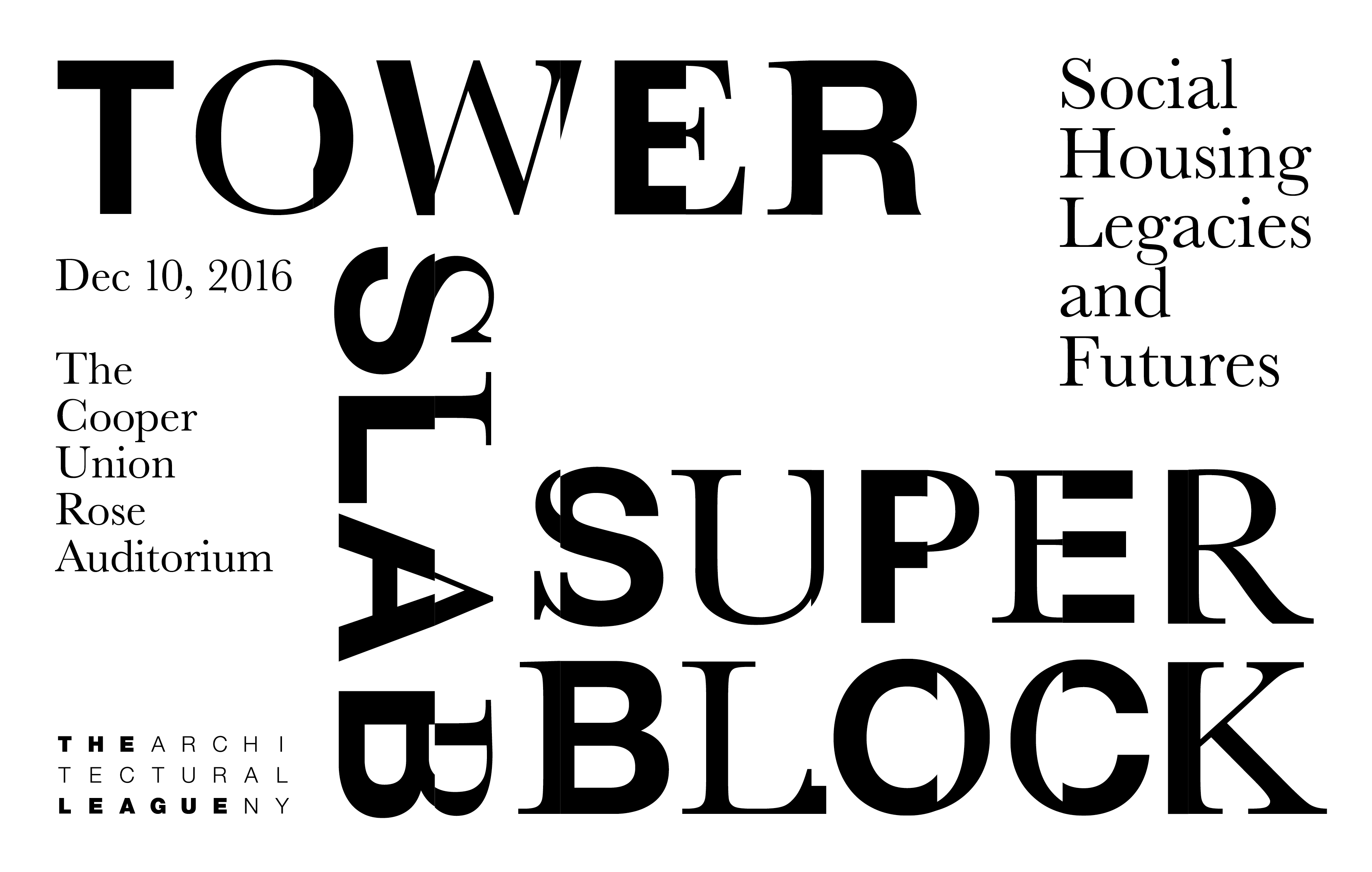Tower, Slab, Superblock: Social housing legacies & futures
Architects, historians, and activists from London, Paris, and Toronto discuss policy and design strategies for reinvigorating postwar social housing to better serve current residents and future generations.
December 10, 2016
9:45 a.m.
Cities worldwide undertook major residential building programs in the mid-twentieth century to create much-needed new housing for workers and low-income residents. Usually built with direct state intervention and in clustered developments on superblock sites, mass housing took different forms—from carefully detailed British council estates to aggressively pragmatist high-rises in the United States—but held the common promise of modern, reasonably priced apartments. This built fabric today represents a significant physical asset, yet in many cases suffers from maintenance issues, financial disinvestment, and social stigma.
Where once demolition seemed the de facto response to these persistent issues, efforts in a number of cities demonstrate that we can serve current residents, steward resources for the future, and reinvigorate the urban fabric through smart public policy and good design. Redevelopment has gone by different names—regeneration, transformation, revitalization—but in many of the best cases looks to maintain and improve the existing building stock and surroundings. When we choose to reinvest—in many cases the more financially, socially, and environmentally conscious decision—how do we do so in ways that benefit and protect current residents?
Tower, Slab, Superblock: Social housing legacies and futures will examine the history, current status, and prospects of high-rise and superblock residential development. The conference will confront questions of design and policy:
- What does it mean to reconsider this building stock as an asset, rather than a liability or failure?
- How can the building stock be reimagined to better serve current residents and future generations?
- What roles can architects, designers, and affiliated professionals play in housing crises?
The day will focus on three cities—London, Paris, and Toronto—each of which is dealing with the twin pressures of increasingly unaffordable housing and diminishing state support.
Architects, historians, and activists will address housing renovation and redevelopment from the perspectives of process (finance, policy, governance, and community engagement) and design (building fabric, public spaces, neighborhood connections, and unit type).
Film Screening 9:45 a.m. – 12:00 p.m.
2.5 AIA and New York State CEUs
Short documentary films and film excerpts about the history and current status of social housing in London, Paris, and Toronto.
9:15 a.m. – 9:45 a.m.
Registration and Coffee
Farewell Oak Street
Toronto – 1953 – Dir: Grant McLean
HIGHRISE: One Millionth Tower
Toronto – 2011 – Dir: Katerina Cizek
Housing Problems
London – 1935 – Dir: Arthur Elton and Edgar Anstey
Cressingham Gardens
London – 2014 – Dir: Sanda Kolar
Utopia London
London – 2010 – Dir: Tom Cordell
Uprooted
London – 2016 – Dir: Ross Domoney
Concrete Stories
France – 2014 – Dir: Lorenz Findeisen
Imaginaries of Transformation
France – 2015 – Dir: Karine Dana
Conference 1:00 p.m. – 6:15 p.m.
5.5 AIA and New York State CEUs
1:00 p.m. – 1:10 p.m.
Welcome
Rosalie Genevro – Executive Director, The Architectural League of New York
1:10 p.m. – 1:25 p.m.
The Design Politics of Social Housing
Lawrence Vale – Ford Professor of Urban Design and Planning at the Massachusetts Institute of Technology
1:25 p.m. – 2:40 p.m.
On London
Geraldine Dening, Co-Founder, Architects for Social Housing
Simon Elmer, Co-Founder, Architects for Social Housing
Phineas Harper, Deputy Director, The Architecture Foundation
Paul Karakusevic, Founder and Partner, Karakusevic Carson Architects
2:40 p.m. – 2:55 p.m.
Commentary
Jean-Louis Cohen – Sheldon H. Solow Professor in the History of Architecture at New York University
2:55 p.m. – 4:00 p.m.
On Paris
Javier Arpa, Research and Education Coordinator of The Why Factory at Delft University of Technology
Kenny Cupers, Associate Professor in the History and Theory of Architecture and Urbanism at the University of Basel
Frédéric Druot, Founder and Partner, Frédéric Druot Architecture
4:00 p.m. – 4:15 p.m.
Coffee Break
4:15 p.m. – 4:30 p.m.
Commentary
Susanne Schindler – Architect, writer, and housing columnist for Urban Omnibus
4:30 p.m. – 5:15 p.m.
On Toronto
Martine August, Postdoctoral Fellow in the Edward J. Bloustein School of Planning and Public Policy at Rutgers University
Graeme Stewart, Principal, ERA Architects
5:15 p.m. – 6:15 p.m.
Conversation and Response
6:15 p.m. – 7:00 p.m.
Reception
Join us in the lobby for light refreshments
Support
Tower, Slab, Superblock is organized by The Architectural League of New York and hosted by the Irwin S. Chanin School of Architecture at the Cooper Union for the Advancement of Science and Art.
This program is supported, in part, by public funds from the New York State Council on the Arts with the support of Governor Andrew Cuomo and the New York State Legislature. This program is also supported by the J. Clawson Mills Fund of The Architectural League.


Explore
A home of one’s own: Micro-lofts for single adults and small families
The micro-loft typology is designed to provide affordable housing for a growing and changing population in New York City.
New models for modular housing
A discussion with Thomas Gluck, Mimi Hoang, Nicole Robertson, and Alex Terzich.
Notes on New York’s housing history
Historian Deborah S. Gardner offered thoughts on housing in New York City as part of the Architectural League's 1987 Vacant Lots project.

